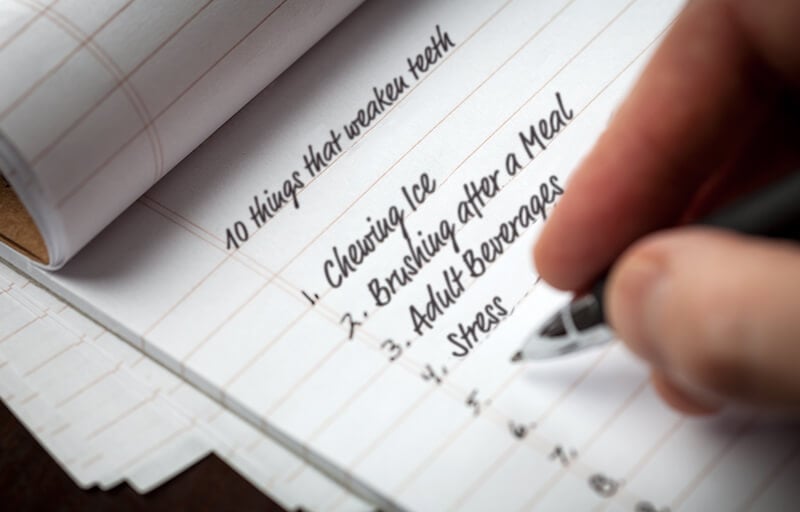It’s not easy being a tooth. Three meals a day, with an average chewing rate of about 10 times per mouthful of food works out to 10,000ish bites per meal equals 30,000 chews a day. And many of us just aren’t kind to our teeth. Read on to discover how to stop making your teeth sad and wrecking your smile.
1: Chewing ice – You probably know this already, but it’s worth repeating. Yes, chomping cool, crunchy ice is refreshing and oddly addictive. Succumb to that urge and you’re risking dental damage such as cracked and chipped teeth, damage to tooth enamel, plus wrecking any dental work you have such as fillings and crowns. You may also find your teeth become extremely sensitive to hot and cold drinks and foods, and are more prone to cavities. Not worth it – find something else to chew on.
2: Brushing after a meal – wait, what? Isn’t this a dental health must-do? It depends. If you’ve consumed acidic foods or drinks or sugars/carbs, the enamel on your teeth may have softened a bit. So gently rinse your mouth out with plain water right after your meal and wait an hour to brush.
3: Yummy adult beverages – if your drink tastes like dessert, it’s bad for your teeth. Alcohol softens your tooth enamel, and sugar breaks down to fuel for oral bacteria. So, your teeth are having a really bad time while you’re getting happy. If you’re going to drink, opt for beverages like wine or beer that aren’t packed with sugar.
4: Stress – your body goes into caveperson mode when you’re stressed out. Your brain prompts your adrenal glands to release a surge of hormones, including adrenaline and cortisol that are useful in helping you to fight the threat or run away from it very quickly. This worked great for our Neolithic ancestors but is less than useful when the problem is job demands or a traffic jam. An overabundance of adrenaline in your system can cause you to grind your teeth, chipping and cracking them. It can also cause high blood pressure, angina, headaches, upset stomach or heartburn, sore throats (due to dry mouth, which is also really bad for your teeth), and sleep disorders.
5: Overly-enthusiastic brushing – You might figure that a good, hard brushing is more likely to remove food debris and just-forming plaque than a gentler approach. But aggressive brushing can actually cause cavities, tooth decay, and gum disease. You can get your teeth clean without scrubbing them unmercifully. And remember that regular professional cleanings are the best way to maintain a bright, healthy smile.
6: Sugar-free foods: Blame it on the acid, again. Research by the University of Melbourne’s Oral Health division found that sugar-free foods and drinks with acidic additives and low pH levels can damage the enamel, regardless of whether the item contains sugar or not. For example, the research team found that sugar-free drinks like Diet Coke can soften enamel by 30 to 50 percent. So, don’t assume that sugar-free means safe-for-your-smile.
7: Bottled water – the water that comes out of your tap probably contains fluoride, which makes teeth more resistant to damage and helps repair minor dental decay. Drinking bottled water may mean you’re not getting the optimum dose of fluoride. But if you don’t like your tap water don’t panic. Kids can get fluoride and sealant treatments. If you’re an adult who is at higher risk of dental decay due to medical issues, dry mouth, or dental restorations such as bridges or crowns ask your dentist if you should use a fluoride rinse.
8: Social media – following the latest DIY dental care tips online (we’re looking at you, YouTube) can result in an epic disaster for your smile. From homemade braces to brushing teeth with highly abrasive substances, denture repair and dental alterations like reshaping teeth with files – don’t rely on random strangers for oral health advice and treatment suggestions. Your dentist went to school for nearly a decade to learn how to care for your teeth.
9: Treating teeth as tools: Can openers, corkscrews, and scissors are tools. Your teeth are not tools. The next time you consider using your teeth to pry open, rip, remove or snap something – take a minute and grab the right tool instead. Emergency trips to the dentist, a lot of pain, and plenty of money can be saved if you treat your teeth right.
10: Avoiding the dentist: If it’s not broken, don’t fix it, right? Nope. That advice may work for cars and computers, but your teeth need regular checkups and cleanings. Professional care will help prevent oral disease and can also address any evolving issues well before they become painful and expensive problems.
If you’ve been skipping regular checkups and cleanings due to budget concerns and no dental insurance, consider getting a dental savings plan. These plans are a very affordable alternative to dental insurance, providing members with discounts of 10%-60% on the majority of dental services. Plus, unlike insurance, there’s no waiting before you qualify for care and no annual spending limit. Find out more at dentalplans.com.
